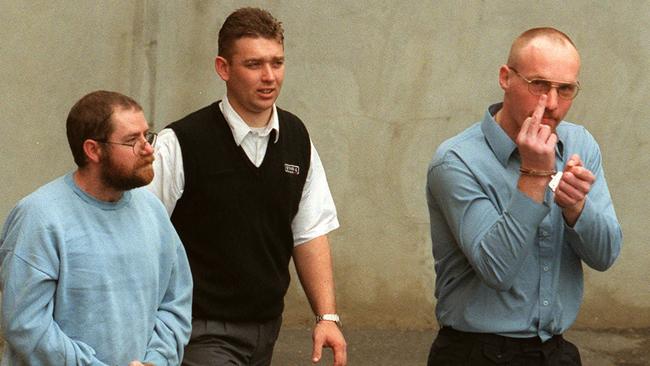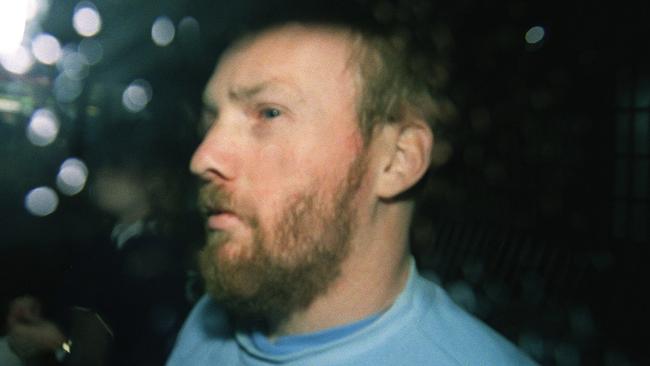Bodies in the barrels killer Robert Joe Wagner makes first parole bid
“Bodies in the barrels” serial murderer Robert Joe Wagner says he needs a non-parole period because authorities are intercepting his mail and preventing a visitor from “helping” him and his fellow killer John Justin Bunting.

True Crime
Don't miss out on the headlines from True Crime. Followed categories will be added to My News.
- ‘Bodies in the barrels’ serial killer launches bid for parole
- How serial killers’ twisted friendship spiralled into murder
- Detective: ‘Serial killer must stay in jail’
- Serial killer Robert Wagner refused legal aid for parole bid
“Bodies in the barrels” serial murderer Robert Joe Wagner says he needs a non-parole period because prison authorities are intercepting his mail and preventing a visitor from “helping” him and his fellow killer John Justin Bunting.
In the Supreme Court on Monday, Wagner also complained of media scrutiny of his freedom bid and asked his confessions to some of the murders be taken into account.
Now bald and sporting a greying goatee beard, Wagner asked the court to set a non-parole period on his sentence.
Representing himself and speaking from the dock, he sought to tender documents he claimed showed his efforts to rehabilitate — but said he would do so only if the court promised to keep them from the media.
“I didn’t know that me asking for a non-parole period to be fixed would make the news reports … I didn’t think the media would show it on the news,” he said.
“I would like to know who gave it to them and why it was given to them.”
Justice Greg Parker, who will determine Wagner’s application, interrupted the convicted killer.
“I authorised it being released,” he said.
Visibly frustrated, Wagner replied “okay” and pushed on, reminding the court he had pleaded guilty to three murders and arguing that should weigh in his favour.
Justice Parker, however, reminded Wager he had been convicted of seven more.

Last week, The Advertiser revealed Wagner, 48, had launched court action to secure a non-parole period.
He is serving 10 consecutive life sentences while John Bunting — the ringleader of the 1990s murder spree — is serving 11, and both were jailed without the possibility of parole.
The bodies of some of their victims were found in barrels in a disused bank vault at Snowtown, while others were buried in the back yard of a northern suburbs house.
Wagner — who fried and ate the flesh of his last victim — made a statement on the day of his sentencing, doubling down on his crimes.
“Paedophiles were doing terrible things to children … the authorities didn’t do anything about it … I decided to take action … I took that action,” he said.
The majority of the victims were not paedophiles, and Wagner and Bunting used their social security payments and bank accounts to line their own pockets.
Wagner now wants a non-parole period set so that he has a “goal” to work toward during his time in jail.
In his application, he says he known any such period will be lengthy if set, but he wants the chance to see and foster a relationship with his now-adult son.
Under state law, an application for a non-parole period may be rejected if a court deems it “inappropriate”.
Applicable reasons for doing so including the gravity or circumstances of the offence and the applicant’s criminal record.
Wagner’s bid caused outrage among victims rights groups — and it is not the first time his actions in prison have done so.
In 2014, The Advertiser revealed he was using a US-based online forum to correspond with women, and his profile was taken down after victims’ groups protested.
Wagner arrived at the Supreme Court by prison van, just before his scheduled 10am hearing, flanked by three prison guards.
They sat at the back of the public gallery while Justice Parker addressed Wagner, saying he had read the court’s 2003 sentencing in preparation for the hearing.
“It seems to me there’s a number of observations made that are going to be influential in the way we approach your application,” he said.
“Justice (Brian) Martin found it was difficult to envisage more serious criminal conduct, and that you had not shown the slightest sign of contrition.
“He found you were incapable of true rehabilitation and, due to the gravity of your crimes, he was not required to fix a non-parole period.
“The task is for you to persuade the court that those matters are no longer relevant.”
Wagner said he knew his application would “upset people” but argued it was necessary for his own mental health.
He outlined rehabilitative alcohol, drug and anger management programs he had undertaken, but said his lack of a non-parole period denied him access to other courses.
“I have documentation about them but, if the media are going to get a hold of them, I will not give them to you,” he told Justice Parker.

Wagner argued he had shown good progress within prison.
“When I came to jail, it was very hard for me to read and write,” he said.
He also complained of the way in which the Department for Correctional Services treated him.
“Why does Corrections think it’s okay for me to babysit someone who might be mentally ill, or might hurt themselves, when people say I shoudn’t have a non-parole period?” he said.
Corrections will not let one of my visitors come in and see me and my co-accused because the visitor is trying to help us with what goes on in jail.
“I’m also asking this because Corrections will not allow me to have some of my mail.”
Justice Parker said such concerns were “prison management issues” and “not relevant” to the question of non-parole.
“They are to me – they can’t stop me from seeing people, only the Parole Board can stop me from seeing people,” Wagner replied.
“If I get out of jail, that will allow me to spend my final years with my son.”
Carmen Matteo, prosecuting, said the court should not even consider ordering reports about Wagner’s purported rehabilitation.
She said state law made it plain such reports should be ordered only when a court was satisfied a non-parole period should be imposed.
“We oppose the fixing of a non-parole period on the basis it would be inappropriate to do so because of the gravity of the crimes and the circumstances surrounding them,” she said.
“In our submission, the threshold (for ordering reports) will never be reached.”
Justice Parker agreed the court should first hear argument about whether or not a non-parole period would be appropriate.
He remanded Wagner in custody until next week.



